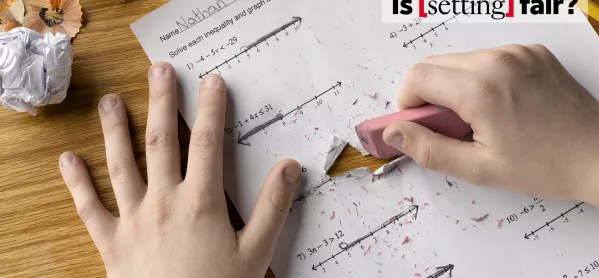Almost a third of pupils are misallocated to higher or lower maths sets, according to the latest findings of landmark research into grouping by attainment.
The findings follow work by a team of academics from the UCL Institute of Education and Queen’s University Belfast, who discovered that top-set students were more likely to be white and middle class, while bottom-set students were more likely to be working class and black.
The latest findings, in an unpublished paper seen by Tes, come from an analysis of data from 9,301 Year 7 pupils at 46 secondary schools in England.
The researchers compared which maths set the pupils should have been put in - based on their key stage 2 Sats maths scores - with the sets they were actually placed in.
They found that 31.1 per cent of pupils were placed in sets that were either higher or lower than their end-of-primary results would have warranted.
Setting ‘should only be based on prior attainment’
Of this group, almost equal proportions were misallocated upwards (15.7 per cent) and downwards (15.5 per cent).
Professor Becky Francis, director of the UCL Institute of Education, told Tes that one tip for schools was to make sure that “if you are using setting, you are strictly limiting set placements to being factored on prior attainment in that specific subject area and not letting other factors play into that”.
“It’s at the point at which other factors start playing that we start introducing bias, as well as moving away from the conceptual rationale for attainment grouping in the first place,” she added.
Previous papers published by the team have raised concerns about the effect of setting on pupils who are put in lower ability groups.
Research published in the International Journal of Educational Research last year found “a clear relationship” between a pupil’s set level and their self-confidence, both in that specific subject and with learning more broadly.
For those in high attainment sets, “this may cement their confidence”, while “for those in lower sets the reverse is true”.
You can read more about the findings about setting in tomorrow’s Tes magazine, available in all good newsagents. To download the digital edition, Android users can click here and iOS users can click here





